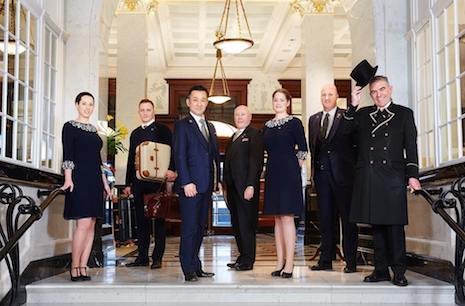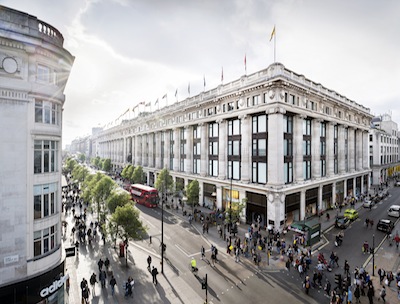 Burberry's iconic trench coat
Burberry's iconic trench coat
While the United Kingdom is just beginning its negotiations to leave the European Union, a new report from Walpole finds that about half of the luxury organization’s members are already experiencing some negative effects from the split.
Now that the U.K. has triggered article 50, Walpole is making policy recommendations that will support the luxury industry’s needs, including trade, talent and tourism. A valuable part of Britain’s economy, the luxury sector represents 2.2 percent of the nation’s total GDP.
"The British luxury sector is hugely important – it’s worth 32.2 billion pounds to the U.K. economy and contributes 5.2 billion pounds to the exchequer, but these figures only tell part of the story," said Helen Brocklebank, CEO of Walpole.
"Luxury businesses employ 113,000 people across the country in craft, creative and management roles, creating jobs and nurturing skills," she said. "It is therefore vitally important that we have a voice during the Brexit negotiations.
"Added to this, a quarter of British luxury is in foreign ownership, much of which is European ownership—think of BMW and Rolls-Royce, or Prada and Church’s shoes, for example—and more than 30 percent of the British luxury workforce are non-U.K. E.U. nationals, so the issues thrown up by Brexit are not just issues for Britain, but for European luxury as a whole."
Walpole’s “Thriving After Brexit” report is based on a survey taken by its members as well as conclusions drawn following a series of workshops and meetings.
Breaking up
While U.K. residents voted last June to leave the E.U., the official negotiations have just begun, with a slated end date in 2019 (see story).
Following the vote, luxury in Britain saw some positives. Sales this past summer and fall were up between 30-40 percent as buyers flocked to the U.K. to take advantage of the weaker pound.
The fallout has not all positive, however. Walpole points out that the smaller houses are apt to feel more pain from trade barriers, currency shifts or legislation changes.
According to a 2015 report by Walpole and Frontier Economics, luxury generated 32.2 billion pounds, or about $40 billion, in sales. The sector has also been growing faster than the U.K.’s economy.
 Dunhill spring/summer 2016 campaign
Despite geopolitical and economic turmoil, the British luxury goods sector is expected to grow in the coming years. Projected sales in 2019 are 50 billion pounds, and about 158,000 people are forecasted to work in the industry then.
Beyond the luxury companies themselves, the industry’s health also impacts other sectors, including tourism.
In light of this, Walpole has proposed a number of measures that will help luxury goods maintain their momentum.
As outlined in the report, one key need for luxury goods is trade, since more than three quarters of goods produced are exported. In particular, Walpole suggests trade deals with the United States, China, the Middle East and Europe.
"The supply chains and distribution models are fully integrated across Europe and changes to customs and tariffs, as well as the administrative burden around changes to labeling, will impact businesses," said Charlotte Keesing, Walpole’s director of public affairs and international
Along with moving goods, the report also calls for the U.K. to remain appealing to foreign investors, as many companies rely on capital coming from other nations. For instance, Alexander McQueen is owned by France's Kering, Switzerland's Richemont holds Alfred Dunhill and Harrods is owned by a Qatari investor.
Walpole also stresses the need to allow brands the resources they need from the rest of Europe, whether materials or talent.
Between 30-40 percent of workers in Britain’s luxury industry come from other parts of the E.U., and this statistic is even higher in hospitality companies. While citizens can move freely between E.U. member states, the U.K. is expected to take back control on immigration.
Dunhill spring/summer 2016 campaign
Despite geopolitical and economic turmoil, the British luxury goods sector is expected to grow in the coming years. Projected sales in 2019 are 50 billion pounds, and about 158,000 people are forecasted to work in the industry then.
Beyond the luxury companies themselves, the industry’s health also impacts other sectors, including tourism.
In light of this, Walpole has proposed a number of measures that will help luxury goods maintain their momentum.
As outlined in the report, one key need for luxury goods is trade, since more than three quarters of goods produced are exported. In particular, Walpole suggests trade deals with the United States, China, the Middle East and Europe.
"The supply chains and distribution models are fully integrated across Europe and changes to customs and tariffs, as well as the administrative burden around changes to labeling, will impact businesses," said Charlotte Keesing, Walpole’s director of public affairs and international
Along with moving goods, the report also calls for the U.K. to remain appealing to foreign investors, as many companies rely on capital coming from other nations. For instance, Alexander McQueen is owned by France's Kering, Switzerland's Richemont holds Alfred Dunhill and Harrods is owned by a Qatari investor.
Walpole also stresses the need to allow brands the resources they need from the rest of Europe, whether materials or talent.
Between 30-40 percent of workers in Britain’s luxury industry come from other parts of the E.U., and this statistic is even higher in hospitality companies. While citizens can move freely between E.U. member states, the U.K. is expected to take back control on immigration.
 Image source The Savoy
In addition to protecting British residency for current employees, the report also asks for the continued free movement of labor, something that 83 percent of members agree on.
Even when British companies try to hire locals, they find that they either do not get applicants or they do not have candidates with the right skill set. Walpole asks for governmental support to train local talent to ensure British citizens can fill needed roles.
In addition to getting potential employees into the country, Walpole calls for revised visa policies.
On average, about a third of Walpole members’ total luxury sales come from tourists, but the statistic is as high as 80 percent for some brands.
Looking to capture more of these sales, Walpole is requesting simpler visa processes for affluent travelers from areas such as India, Vietnam and the Middle East, as well as asking for China’s 10-year visa cost to be lowered.
Other wish list items include the completion of Heathrow Airport’s expansion and longer opening hours on Sundays, which are currently restricted by law to between the hours of 10 a.m. and 6 p.m. Walpole proposes establishing “international zones” that would remain open longer.
Image source The Savoy
In addition to protecting British residency for current employees, the report also asks for the continued free movement of labor, something that 83 percent of members agree on.
Even when British companies try to hire locals, they find that they either do not get applicants or they do not have candidates with the right skill set. Walpole asks for governmental support to train local talent to ensure British citizens can fill needed roles.
In addition to getting potential employees into the country, Walpole calls for revised visa policies.
On average, about a third of Walpole members’ total luxury sales come from tourists, but the statistic is as high as 80 percent for some brands.
Looking to capture more of these sales, Walpole is requesting simpler visa processes for affluent travelers from areas such as India, Vietnam and the Middle East, as well as asking for China’s 10-year visa cost to be lowered.
Other wish list items include the completion of Heathrow Airport’s expansion and longer opening hours on Sundays, which are currently restricted by law to between the hours of 10 a.m. and 6 p.m. Walpole proposes establishing “international zones” that would remain open longer.
 Selfridges' Oxford Street flagship
Luxury brands rely heavily on their ability to dictate where and how their products are sold. While the E.U. has policies in place to safeguard brands’ rights to selectively distribute, British brands would like to see the U.K. enact similar protections.
"U.K. luxury is largely export-orientated with 78 percent of what we make here in value terms destined for overseas markets," Ms. Keesing said. "This contributes to the U.K.’s travel and tourism industries and plays a key role in soft power diplomacy.
"Think about the global allure of Mulberry, Glenmorangie, Burberry or Aston Martin, for example," she said. "British luxury brands have enormous ambassadorial power for Britain and each one of these products says something profound about the creativity, entrepreneurship and craftsmanship of brand Britain. And importantly it's a sector, one of the few, which has shown consistent and sustainable growth."
Mixed outlook
Walpole is not the only industry organization vying for the British government's attention surrounding Brexit. Auto manufacturers from around the United Kingdom have called on the government to come up with some sort of plan to help keep them competitive in the wake of Britain leaving the European Union.
The Society of Motor Manufacturers and Traders issued a statement calling for the U.K. government to come up with a plan to safeguard the country's auto competitiveness. With Brexit now fully underway, U.K. luxury automotive brands will face fiercer competition from European counterparts (see story).
Even with change on the horizon, not every industry is concerned.
While Brexit has sent large segments of the business world into frantic speculation over what the future will bring, real estate is one area where things are not necessarily looking so grim.
Demand for housing in the United Kingdom is still high, and while the initial shakeup of the industry may make a dent, some experts believe that real estate should fare just fine in the future. Nevertheless, these predictions hinge on the exact terms of Brexit once it is in place (see story).
"Walpole intentionally titled the report 'Thriving after Brexit’ as we can see opportunities around international growth and expansion, as well as investment opportunities and the importance of tourism," Ms. Brocklebank said.
"Luxury brands take a very long-term view when it comes to brand health," she said. "Fortnum & Mason, founded in 1707 and Wedgwood, founded in 1759, are just two examples of brands who’ve continued to thrive in the context of far greater challenges than Brexit.
"No one can pretend the next chapter isn’t going to be difficult, but the lessons of history tell us that British luxury brands treat times of change as an opportunity to come back even stronger."
Selfridges' Oxford Street flagship
Luxury brands rely heavily on their ability to dictate where and how their products are sold. While the E.U. has policies in place to safeguard brands’ rights to selectively distribute, British brands would like to see the U.K. enact similar protections.
"U.K. luxury is largely export-orientated with 78 percent of what we make here in value terms destined for overseas markets," Ms. Keesing said. "This contributes to the U.K.’s travel and tourism industries and plays a key role in soft power diplomacy.
"Think about the global allure of Mulberry, Glenmorangie, Burberry or Aston Martin, for example," she said. "British luxury brands have enormous ambassadorial power for Britain and each one of these products says something profound about the creativity, entrepreneurship and craftsmanship of brand Britain. And importantly it's a sector, one of the few, which has shown consistent and sustainable growth."
Mixed outlook
Walpole is not the only industry organization vying for the British government's attention surrounding Brexit. Auto manufacturers from around the United Kingdom have called on the government to come up with some sort of plan to help keep them competitive in the wake of Britain leaving the European Union.
The Society of Motor Manufacturers and Traders issued a statement calling for the U.K. government to come up with a plan to safeguard the country's auto competitiveness. With Brexit now fully underway, U.K. luxury automotive brands will face fiercer competition from European counterparts (see story).
Even with change on the horizon, not every industry is concerned.
While Brexit has sent large segments of the business world into frantic speculation over what the future will bring, real estate is one area where things are not necessarily looking so grim.
Demand for housing in the United Kingdom is still high, and while the initial shakeup of the industry may make a dent, some experts believe that real estate should fare just fine in the future. Nevertheless, these predictions hinge on the exact terms of Brexit once it is in place (see story).
"Walpole intentionally titled the report 'Thriving after Brexit’ as we can see opportunities around international growth and expansion, as well as investment opportunities and the importance of tourism," Ms. Brocklebank said.
"Luxury brands take a very long-term view when it comes to brand health," she said. "Fortnum & Mason, founded in 1707 and Wedgwood, founded in 1759, are just two examples of brands who’ve continued to thrive in the context of far greater challenges than Brexit.
"No one can pretend the next chapter isn’t going to be difficult, but the lessons of history tell us that British luxury brands treat times of change as an opportunity to come back even stronger."
